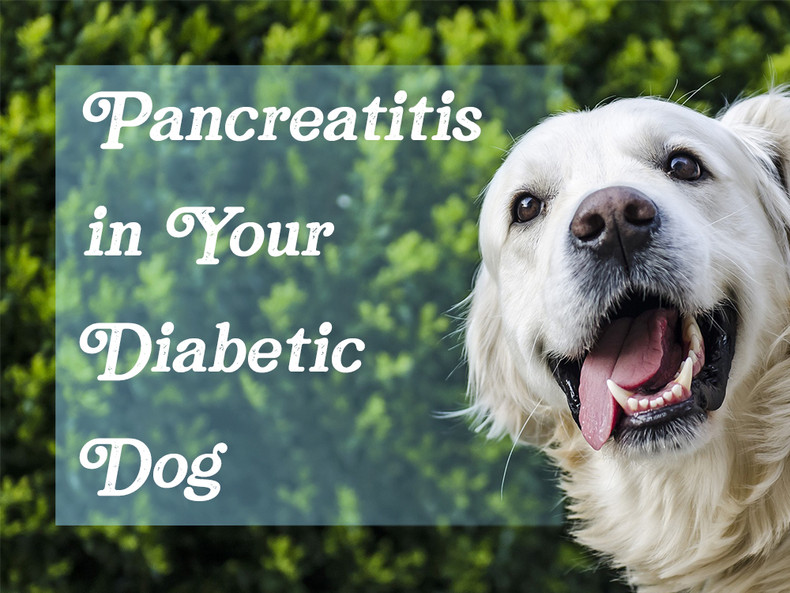Pancreatitis in Your Diabetic Dog
I have touched on Pancreatitis in earlier posts, but today we are going to take a deeper dive as it seems that I am seeing more and more cases of it recently. While doing research for this blog post, I have learned some new information that may help to keep this nasty condition at bay. Read on…
What is the pancreas and what does it do? The pancreas is an organ that is on the right side of the abdomen right next to the stomach. It produces enzymes to assist in food digestion and hormones like insulin which regulates blood glucose. The digestive enzymes are secreted into the small intestine to aid digestion and the hormones (insulin) enter the bloodstream directly. We already know that our pups pancreas is compromised to the point that it no longer produces insulin, hence the insulin injections that we give twice a day.
What causes pancreatitis physiologically? Normally, the pancreatic enzymes are created in an inactive state. They travel through a duct into the small intestine where they activate to help digest food. With pancreatitis, the enzymes are activated prematurely and begin digesting while still inside the pancreas, which means that the pancreas is digesting itself. Ouch!!!
There is no specific “cause” of pancreatitis, but it seems to be triggered by a few things that are identifiable. Some of those things are fatty food, steroid use, anti-seizure meds such as potassium bromide or phenobarbital and certain diuretics like Lasix or furosemide.
The fatty food issue we have discussed in prior posts so I’ll just summarize here. Being that our pups are Diabetic, we know that they are prone to pancreatitis so we feed food that is at or below 12% fat on a dry matter basis. There are dry matter calculators online that you can use to check your food. Now, if your pup has had pancreatitis in the past, it is suggested that you feed food that is at or below 10% fat on a dry matter basis. There are some that believe that kibble, because it is so hard to digest, can also be a trigger for a pancreatitis flare if your pup has chronic pancreatitis and is very susceptible. The theory is that because kibble is so hard, it stresses the pancreas because it has to produce so many enzymes to digest the food.
What are the symptoms of Pancreatitis?
- Fever
- Vomiting
- Diarrhea
- Loss of appetite (anorexia)
- Weight loss (more common in cats)
- Dehydration
- Fatigue and sluggishness
- Mild to severe abdominal pain (may become more sever after eating)
- Depression
- Increased heart rate
- Difficulty breathing
How is Pancreatitis treated? Depending on how severe the flare, it can be treated at home or in a more severe flare, it must be treated at the clinic. At home treatment would entail a very bland diet of chicken breast and overcooked rice. In a non-diabetic, you would ideally rest the GI tract and not feed, but we don’t have that luxury as our pups need food to get their insulin. So, a very bland, easily digestible diet it is. You will need to feed small meals so as not to overtax the tummy and adjust insulin accordingly. Added to that would likely be something for pain and if vomiting, some anti-nausea medications like Cerenia. An injectable is preferable because we are trying to rest the digestive tract as much as possible. Ask your vet for some pre-filled syringes (we all know that we can give a sub-q injection) to get you through the flare.
So how do we try to control pancreatitis in our pups, especially those that are prone to it? If your pup is highly susceptible, you may want to consider a home cooked diet or a canned food diet with digestive enzymes to keep the pancreas from having to overproduce to digest kibble and processed canned food.
Exercise is another way to support your pup if he/she is highly susceptible to pancreatitis. Exercise (daily walks) is a good way to keep the gut moving and the GI Tract (Gastrointestinal Tract) as healthy as it can be. Canine Obesity can also trigger pancreatitis, so daily walks will help with this aspect as well.
Like most things Diabetes related, with a little diligence, we can just add a small step or two to our daily regimen to prevent these nasty flares of pancreatitis. I hope that this will help you come up with a plan to prevent any flares.
Notice that for most of the products or groups that I mention, the text is linked to a website that you can purchase that item or a link to join the group mentioned. Just click on the colored text (red or blue, depending what device you are on) and it should take you right to the item or group. If you have any thoughts or ideas for topics that you’d like to see covered here, please feel free to comment below or send me an email at NancyForPetTest@PharmaSupply.com. As always, please “like” this blog post or any of the others that have helped you or just refreshed your memory. Look for new posts every Monday, Wednesday and Friday!
Until next time…

